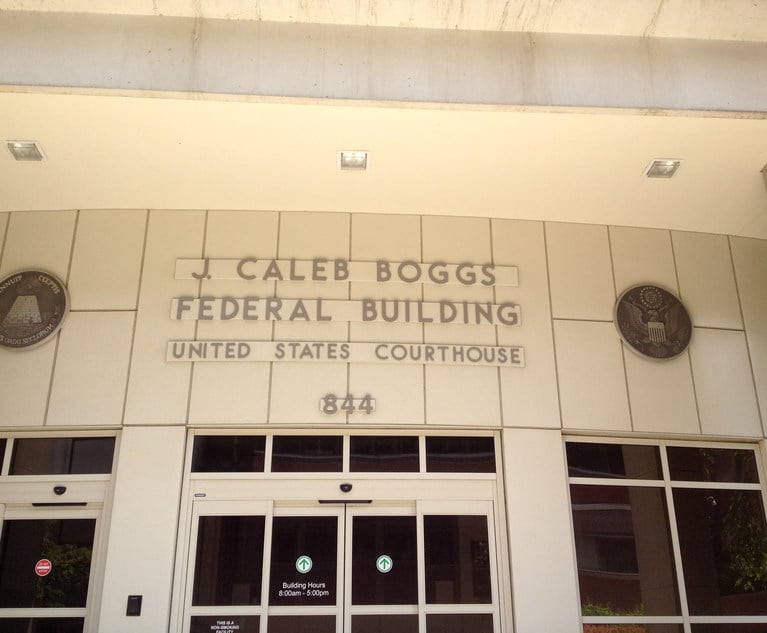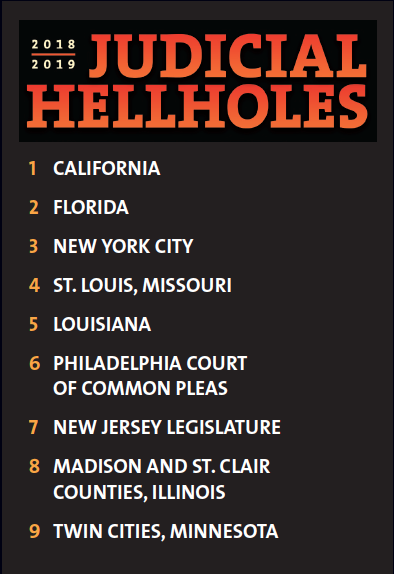Delaware Supreme Court Gets 'Dishonorable Mention' in This Year's 'Judicial Hellholes' Report
Delaware may not be a full-fledged “Judicial Hellhole," but it couldn't fully escape the American Tort Reform Association's scorn this year.
December 04, 2018 at 07:10 PM
6 minute read
The original version of this story was published on Law.com
 Credit: PrasongTakham/Shutterstock.com.
Credit: PrasongTakham/Shutterstock.com.
Delaware may not be a full-fledged “Judicial Hellhole,” but it couldn't fully escape the American Tort Reform Association's scorn this year.
The 2018-2019 “Judicial Hellholes,” published by ATRA, ranked the nation's top nine venues with the “most unfair” legal systems. While Delaware did not rank among those nine, the Delaware Supreme Court was still slapped with a “Dishonorable Mention” tag in the report as a result of its June decision to reinstate a lawsuit over “take-home” asbestos exposure.
In Ramsey v. Georgia Southern University Advanced Development Center, the high court, reversing the Superior Court's dismissal of the case, said the estate of a worker's spouse who regularly washed her husband's asbestos-contaminated clothing had a viable claim against two manufacturers that supplied the dangerous products to his employer.
“The Supreme Court of Delaware reversed its longstanding precedent and held that both manufacturers and employers can be held liable for 'take-home' asbestos exposure,” the ATRA report said.
Still, the report's short blurb on Delaware was mild compared to ATRA's assessments of the jurisdictions that made the “Hellholes” list.
California, which has topped the list at least three prior times, was ranked No. 1 again this year, “due to the propensity of California judges and legislators to extend liability at almost every given opportunity,” according to the report. Last year's report bumped it to No. 2 in favor of Florida, whose highest court came out with a bevy of medical malpractice decisions for plaintiffs. This year, Florida ranked No. 2.
California's top ranking comes after the state's highest court became the first in the nation to hold manufacturers of brand-name pharmaceuticals liable in cases involving their generic equivalents.
“That was such an outlier,” said Sherman “Tiger” Joyce, ATRA's president. “There was a sense that what was going on in California collectively was enough to rule it beyond Florida, and there was not the level of negative activity in Florida.”
New York City's courts jumped to No. 3, while the Philadelphia Court of Common Pleas and New Jersey's legislature, though not its courts, also made the list.
Some overriding concerns in the report involved: the prevalence of “junk science” at trials; class actions, particularly involving food packaging, which the defense bar insists have no injuries; and “activist” attorneys general who have brought cases over opioids and climate change.
Peter Knudsen, a spokesman for the American Association for Justice, the nation's largest plaintiffs bar, said of the report: “ATRA's definition of a 'hellhole' is a courtroom where a plaintiff brings a case in front of a jury to hold an unscrupulous corporation accountable. The real hellhole is a world in which an unsuspecting consumer is harmed, abused or defrauded by an unscrupulous corporation but has no recourse and no chance to prevent future wrongdoing.”
California has been No. 1 in prior years, often cited for its unique laws, like this year's data privacy statute. But the California Supreme Court's Dec. 21 decision last year in T.H. v. Novartis Pharmaceuticals propelled it to the top of the list again. The ruling was the first to impose liability on brand-name drugmakers for the actions of generic pharmaceutical manufacturers, which the U.S. Supreme Court found in 2011 were protected from tort actions by federal pre-emption under Pliva v. Mensing.
At least 35 other state and federal courts have rejected the theory, the report says, but since the California ruling, the Massachusetts Supreme Court has adopted innovatory liability.
“The reason the decision matters is for the first time consumers of generic drugs have a remedy when they're injured by a mislabeled drug,” said Leslie Brueckner, senior attorney at Public Justice who represented the plaintiff. “That's what this decision did. And because 90 percent of the drugs in America that are consumed are generic, it's a huge deal in holding the pharmaceutical industry liable for dangerously labeled drugs.”
Florida continued to rank high after the state's highest court refused to adopt the more defense-friendly standard for expert evidence, named for the U.S. Supreme Court's 1993 decision in Daubert v. Merrell Dow Pharmaceuticals, in its DeLisle v. Crane decision this year. But the report said the Florida Supreme Court was “poised to significantly shift” given that incoming Gov. Ron DeSantis, a Republican, would appoint three members of the court.
The report also expanded its ranking of New York City's Asbestos Litigation court to include all courts in New York City. That's primarily because of a growth in class actions brought over food packaging, Joyce said.
Like years past, the report chastised the Complex Litigation Center in the Philadelphia Court of Common Pleas, ranked No. 6, down one spot from last year, largely because of its pharmaceutical verdicts. And it called Pennsylvania's courts among those to watch because of their acceptance of out-of-state plaintiffs.
New Jersey, ranked No. 6 last year, received mixed reviews this year, with the report claiming it has the “most plaintiff-friendly legislature in the country.”
“For the first time ever, we highlighted not a state for its courts but for its legislature,” Joyce said. “But when you look at the totality of what the New Jersey legislature has done and is poised to do, it's dramatically expanding liability.”
In contrast, the report praised decisions of the New Jersey Supreme Court, such as its ruling enacting the Daubert standard.
Here are a few more highlights from “Judicial Hellholes” report:
- The Twin Cities area of Minnesota joined the list for the first time, at No. 9, because of an $850 million settlement in a groundwater contamination case. The settlement, between Minnesota Attorney General Lori Swanson and against 3M, gave $125 million in contingency fees to outside law firms. The Minnesota Supreme Court also rejected the Daubert standard.
- St. Louis continued to be on the list, at No. 4, down one ranking from last year, due to the legislature's failure to enact tort reform. The report also noted a $4.7 billion verdict against Johnson & Johnson over its baby powder.
- The report put the Georgia Supreme Court on the “watch list” after it upheld a $40 million verdict in Chrysler Group LLC v. Walden this year.
- The report gave kudos—called “Points of Light”—to the U.S. Supreme Court for its decision this year upholding class action waivers in employment contracts, and to the U.S. Court of Appeals for the Fifth Circuit for its reversal of a $502 million verdict over hip implants.
Zack Needles contributed to this report.
This content has been archived. It is available through our partners, LexisNexis® and Bloomberg Law.
To view this content, please continue to their sites.
Not a Lexis Subscriber?
Subscribe Now
Not a Bloomberg Law Subscriber?
Subscribe Now
NOT FOR REPRINT
© 2025 ALM Global, LLC, All Rights Reserved. Request academic re-use from www.copyright.com. All other uses, submit a request to [email protected]. For more information visit Asset & Logo Licensing.
You Might Like
View All
Report: Despite 2021 Filing Decrease, District of Delaware Judges Again Led Securities Caseloads
3 minute read
Trending Stories
- 1Bribery Case Against Former Lt. Gov. Brian Benjamin Is Dropped
- 2‘Extremely Disturbing’: AI Firms Face Class Action by ‘Taskers’ Exposed to Traumatic Content
- 3State Appeals Court Revives BraunHagey Lawsuit Alleging $4.2M Unlawful Wire to China
- 4Invoking Trump, AG Bonta Reminds Lawyers of Duties to Noncitizens in Plea Dealing
- 522-Count Indictment Is Just the Start of SCOTUSBlog Atty's Legal Problems, Experts Say
Who Got The Work
J. Brugh Lower of Gibbons has entered an appearance for industrial equipment supplier Devco Corporation in a pending trademark infringement lawsuit. The suit, accusing the defendant of selling knock-off Graco products, was filed Dec. 18 in New Jersey District Court by Rivkin Radler on behalf of Graco Inc. and Graco Minnesota. The case, assigned to U.S. District Judge Zahid N. Quraishi, is 3:24-cv-11294, Graco Inc. et al v. Devco Corporation.
Who Got The Work
Rebecca Maller-Stein and Kent A. Yalowitz of Arnold & Porter Kaye Scholer have entered their appearances for Hanaco Venture Capital and its executives, Lior Prosor and David Frankel, in a pending securities lawsuit. The action, filed on Dec. 24 in New York Southern District Court by Zell, Aron & Co. on behalf of Goldeneye Advisors, accuses the defendants of negligently and fraudulently managing the plaintiff's $1 million investment. The case, assigned to U.S. District Judge Vernon S. Broderick, is 1:24-cv-09918, Goldeneye Advisors, LLC v. Hanaco Venture Capital, Ltd. et al.
Who Got The Work
Attorneys from A&O Shearman has stepped in as defense counsel for Toronto-Dominion Bank and other defendants in a pending securities class action. The suit, filed Dec. 11 in New York Southern District Court by Bleichmar Fonti & Auld, accuses the defendants of concealing the bank's 'pervasive' deficiencies in regards to its compliance with the Bank Secrecy Act and the quality of its anti-money laundering controls. The case, assigned to U.S. District Judge Arun Subramanian, is 1:24-cv-09445, Gonzalez v. The Toronto-Dominion Bank et al.
Who Got The Work
Crown Castle International, a Pennsylvania company providing shared communications infrastructure, has turned to Luke D. Wolf of Gordon Rees Scully Mansukhani to fend off a pending breach-of-contract lawsuit. The court action, filed Nov. 25 in Michigan Eastern District Court by Hooper Hathaway PC on behalf of The Town Residences LLC, accuses Crown Castle of failing to transfer approximately $30,000 in utility payments from T-Mobile in breach of a roof-top lease and assignment agreement. The case, assigned to U.S. District Judge Susan K. Declercq, is 2:24-cv-13131, The Town Residences LLC v. T-Mobile US, Inc. et al.
Who Got The Work
Wilfred P. Coronato and Daniel M. Schwartz of McCarter & English have stepped in as defense counsel to Electrolux Home Products Inc. in a pending product liability lawsuit. The court action, filed Nov. 26 in New York Eastern District Court by Poulos Lopiccolo PC and Nagel Rice LLP on behalf of David Stern, alleges that the defendant's refrigerators’ drawers and shelving repeatedly break and fall apart within months after purchase. The case, assigned to U.S. District Judge Joan M. Azrack, is 2:24-cv-08204, Stern v. Electrolux Home Products, Inc.
Featured Firms
Law Offices of Gary Martin Hays & Associates, P.C.
(470) 294-1674
Law Offices of Mark E. Salomone
(857) 444-6468
Smith & Hassler
(713) 739-1250







